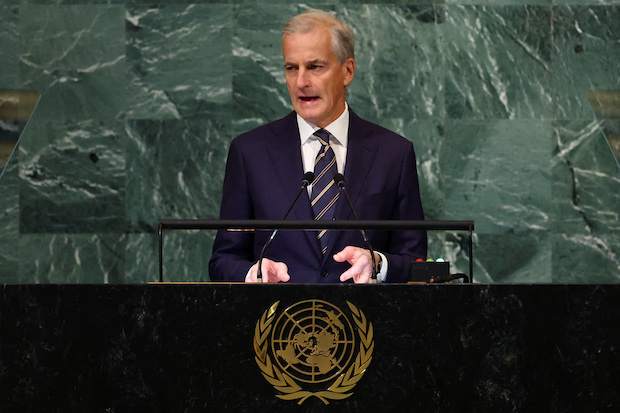Norway raises military alert in response to Ukraine war

Prime Minister of Norway Jonas Gahr Stoere addresses the 77th Session of the United Nations General Assembly at UN Headquarters in New York City, US, Sept. 22, 2022. (Photo by MIKE SEGAR / Reuters)
OSLO — Norway will put its military on a raised level of alert from Tuesday, moving more personnel on to operational duties and enhancing the role of a rapid mobilization force in response to the war in Ukraine, the government said on Monday.
Norway will also seek to bring its new fleet of US-made P-8 Poseidon submarine-hunting maritime patrol aircraft into regular operation at a faster pace than originally planned, the chief of defense, General Eirik Kristoffersen, said.
The scale of alert on which the military operates is classified, however, and the government declined to give details of the level.
There were no concrete threats against Norway now triggering the decision, Kristoffersen told Reuters, but rather the sum of “the uncertainties” was leading authorities to raise the country’s military preparedness.
“We have seen an escalation [in the war] in Ukraine, we [Norway] are training Ukrainian forces, the Ukraine war has changed with the Russian mobilization,” he said in an interview.
Article continues after this advertisement“And at the same time, we have had a gas explosion in the Baltic Sea and drone activity at North Sea platforms.”
Article continues after this advertisementThe raised level is expected to last a year, “possibly more,” Kristoffersen added.
Offshore platforms
Norway first deployed its military to guard offshore platforms and onshore facilities after leaks on the Nord Stream pipelines on Sept. 26 in Swedish and Danish waters and has received support from British, Dutch, French, and German armed forces.
The country’s security police last week arrested a suspected Russian spy who is also involved in protecting gas exports, vital to Europe’s energy supplies this coming winter.
NATO member Norway shares a nearly 200 km (125 mile) land border with Russia in the Arctic, as well as a vast maritime border.
The Nordic nation of 5.4 million people is also now the biggest exporter of natural gas to the European Union, accounting for around a quarter of all EU imports after a drop in Russian flows.
“The continuation of the war in Ukraine, Russia’s attempts at weakening (international) support for Ukraine mean that all countries in Europe must consider that they are exposed to hybrid threats, including Norway,” Prime Minister Jonas Garh Stoere told Reuters.
The armed forces will spend less time training and more time on operational duties. The Home Guard, a rapid mobilization force, will play a more active role.
The air force had called off training in the United States with its F35 fighter jets, preferring to keep them in Norway, said Kristoffersen.